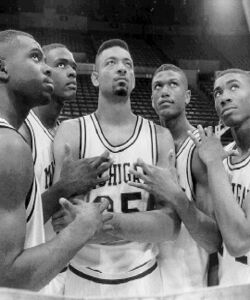(ThyBlackMan.com) No one wants to be called an Uncle Tom. Targeted at middle- or upper-class African Americans, it’s nearly the same as a slur — right up there with the “N” word. Uncle Tom means that you’ve bought into the establishment and are not looking back to the folks who helped you get there. Being called an Uncle Tom means that you’re not really black or, perhaps worse, that you don’t want to be.
Jalen Rose, a retired NBA and college basketball star, executive produced a brilliant documentary on Michigan’s Fab Five, who were arguably the most talented freshman class in college basketball history. They were all great players who came from humble beginnings and brought a swagger to college basketball that we have rarely seen since.
In the documentary, a then 18-year-old Jalen Rose expressed his impression that most of Duke University’s black players, who, at the time,  included Grant Hill, were Uncle Toms. Rose’s statement led to a firestorm of criticism, and incited an angry New York Times Op-Ed response from Hill.
included Grant Hill, were Uncle Toms. Rose’s statement led to a firestorm of criticism, and incited an angry New York Times Op-Ed response from Hill.
Rose, now older and wiser, has defended his comments as those made by his teenage self — a young black boy who loved basketball and knew he would never be recruited by Duke. Hill, however, responded to Rose’s comments as if he made them the other day, imposing that Rose’s remarks were a direct insult to his family, and a dismissal of the accomplishments made by Duke’s black basketball-playing alumni. Hill closed his Op-Ed piece by unnecessarily pointing out that while he was on the team, Duke never lost to the Fab Five.
Now, with all due respect to Grant Hill, the black bourgeoisie, the black man who invented the toilet bowl and the glory of Duke University, brother missed the point. His knee-jerk reaction was, understandably, to defend himself, his family and his blackness — but perhaps he should have asked himself why so many people loved the Fab Five, and what they represented.
As an 18-year-old undergrad, Rose was trying to express the fact that, as an inner-city kid, who, although perhaps unable to articulate it at the time, he felt alienated because he was poor and black. Kids from the hood develop swagger and attitude because 1) they have an innate poetry as a people (kind of like the Irish); and 2) it works really well as a defense mechanism against ongoing societal judgment — the same kind of judgment that assumed the Williams sisters didn’t talk to the other (white) female tennis players because they thought they were better players. When, in reality, they were two young, working-class, teenage black girls used to playing on broken tennis courts in South Central L.A., who were thrust into the predominantly white world of professional tennis with an overly ambitious father pushing them to work harder. So they developed thick skins. Read: attitude.
What is so compelling about the Fab Five is that these young black men left their fear behind to charge on to the world stage without apology. They were young brothers who stayed true to their roots and still became successful in the mainstream.
There are plenty of people who don’t like Duke for the same reasons that prompted Rose’s comments in the documentary — it is widely perceived that Duke doesn’t recruit a certain kind of black player; they don’t go into the hood to find diamonds in the rough, like Michigan and Georgetown did in the ’80s. They mostly recruit players like Grant Hill and Tommy Amaker, who come from privileged backgrounds and are likely to be successful in whatever field they pursue.
Duke is a private institution and has the right to do whatever it wants to do. Hell, as far as sports teams go, the Yankees spend more money than any other team on the planet. But people call Duke elitist because, for many people, they represent a system that prefers to keep the grittier players like Jalen Rose in the margins. But what Grant Hill failed to clarify, at a crucial moment when he had the opportunity to do so, is that if we don’t address the issue of class division within the black community, we’re just perpetuating the notion that the black bourgeois are somehow morally better than common black folk.
For every Jalen Rose who makes it, there are 10 others like him who don’t. And some don’t make it because of their individual choices, but more don’t make it because of a pervasive and elitist attitude that continues to alienate and disenfranchise young black men in America. The only way to combat this issue is to engage in honest and thorough discussions about what’s really going on — Grant Hill didn’t do that with his response in the New York Times.
The first casualty of elitism is compassion. Sadly, as intelligent, well-raised and well-read as Grant Hill is, he’s still unable to see outside of his own world.
Written By S. Biko
Official website; http://twitter.com/stephenbiko

















Leave a Reply